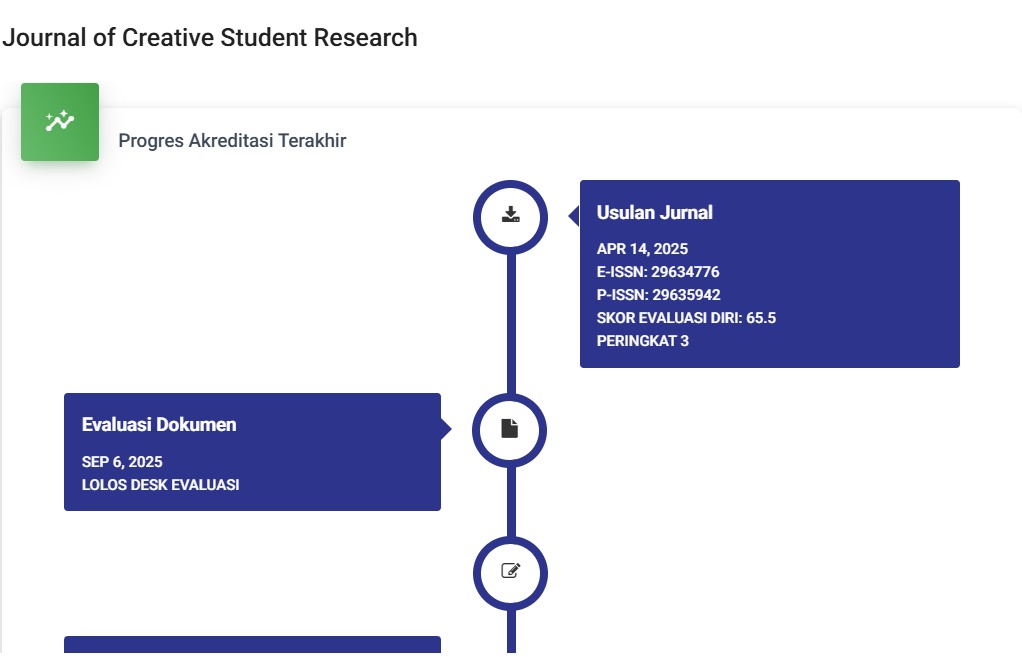Pengaruh Efikasi Diri Akademik Terhadap Prestasi Akademik pada Mata Pelajaran Ekonomi
DOI:
https://doi.org/10.55606/jcsr-politama.v2i4.4046Keywords:
academic self-efficacy, academic achievement in economicsAbstract
This research aims to determine the effect of academic self-efficacy on the academic achievement in economics of grade X and XI students at SMAN 1 Balen in the subject of economics. This study employs a quantitative method with an ex post facto approach. The population used in this study consists of grade X and XI students who take economics classes. The sample size for this study was determined using the Slovin formula with a 5% error rate, resulting in 172 students. The instrument in this study uses a questionnaire statement with a Likert scale to measure the academic self-efficacy variable (X) and academic achievement, which can be seen from the odd semester's Final Summative Assessment (SAS) scores for the 2023/2024 academic year. Data analysis in this study uses simple linear regression analysis by examining the t-test and significance value. Several stages are conducted in this study, including the validity and reliability tests of the statement items, classical assumption tests (normality and linearity tests), and the t-test. The results of this study indicate that the academic self-efficacy variable (X) has a positive effect on the academic achievement in economics of grade X and XI students at SMAN 1 Balen, as shown by the calculated t-value of 8.156, which is greater than the t-table value of 1.973, or a significance level of 0.000 < 0.05, meaning Ho is rejected and Ha is accepted. The influence of academic self-efficacy on academic achievement in economics is quite strong at 53%, while the remaining 47% is influenced by other independent variables. The higher the academic self-efficacy possessed by the students, the higher the academic achievement in economics they will attain, and conversely, if the students' academic self-efficacy is low, their academic achievement in economics will also be low.
Downloads
References
Bandura, A. (1997). Self-efficacy: The exercise of control. New York: W. H. Freeman and company.
D’Alessio, F. A., Avolio, B. E., & Charles, V. (2019). Studying the impact of critical thinking on the academic performance of executive MBA students. Thinking Skills and Creativity, 31, 275–283. https://doi.org/https://doi.org/10.1016/j.tsc.2019.02.002
Gusniwati, M. (2015). Pengaruh Kecerdasan Emosional dan Minat Belajar terhadap Penguasaan Konsep Matematika Siswa SMAN di Kecamatan Kebon Jeruk. Jurnal Formatif UNINDRA, 5(1).
Jung, K. R., Zhou, A. Q., & Lee, R. M. (2017). Self-efficacy, self-discipline and academic performance: Testing a context-specific mediation model. Learning and Individual Differences, 60(November 2016), 33–39. https://doi.org/10.1016/j.lindif.2017.10.004
Kadarmanto, A., & Novianti, H. F. (2022). PENGARUH KECERDASAN EMOSIONAL PESERTA DIDIK KELAS XI SMK MIFTAHUL ULUM BONDOWOSO TERHADAP HASIL BELAJAR MATEMATIKA MATERI PELUANG PADA MASA PANDEMI COVID-19. Progresif: Media Publikasi Ilmiah, 10(1), 34–44.
Köseoğlu, Y. (2015). Self-Efficacy and Academic Achievement – A Case From Turkey. Journal of Education and Practice, 6(29).
Liem, G. A. D. (2019). Academic performance and assessment. Educational Psychology, 39(6), 705–708.
Manurung, T. M. S. (2017). Pengaruh Motivasi dan Perilaku Belajar Terhadap Prestasi Akademik Mahasiswa. Jurnal Analisis Sistem Pendidikan Tinggi, 1(1), 17–26.
Phan, H. P., Ngu, B. H., Shih, J.-H., Lin, R.-Y., Shi, S.-Y., & Wang, H.-W. (2020). Validating ‘optimizing’ concepts: the importance of personal resolve, effective functioning, and academic striving. Educational Psychology, 40(4), 448–472. https://doi.org/http://dx.doi.org/10.1080/01443410.2019.1693507
Rizkiana, A. (2014). PENGARUH STATUS SOSIAL EKONOMI ORANG TUA, MOTIVASI BELAJAR, DISIPLIN BELAJAR TERHADAP PRESTASI BELAJAR PADA SISWA SMK BARUNAWATI SURABAYA. Jurnal Ekonomi Pendidikan Dan Kewirausahaan, 2(2), 186–200.
Sagone, E., & Caroli, M. E. De. (2014). Locus of control and academic self-efficacy in university students: the effects of Self-concepts. Procedia - Social and Behavioral Sciences, 114, 222–228. https://doi.org/https://doi.org/10.1016/j.sbspro.2013.12.689
Siregar, N. (2017). Hubungan motivasi berprestasi dengan prestasi akademik pada mahasiswa Fakultas Psikologi Universitas Prima Indonesia. Jurnal Diversita, 3(1), 40–46.
Sugiyono. (2017). Metode Penelitian Kuantitatif, Kualitatif, dan R&D. Alfabeta.
Tarumasely, Y. (2021). PENGARUH SELF REGULATED LEARNING DAN SELF EFFICACY TERHADAP PRESTASI AKADEMIK MAHASISWA. JPE (Jurnal Pendidikan Edutama), 8(1), 71–80.
Turgut Atak, N., & Meriç, M. (2023). The Determination of the Psychological Resilience, Academic Achievement and Academic Self-Efficacy of Nursing Students. Cyprus Journal of Medical Sciences, 7(6), 767–773. https://doi.org/10.4274/cjms.2020.2343
Viviers, H. A., Villiers, R. R. De, & Merwe, N. Van Der. (2023). The impact of self-efficacy beliefs on first-year accounting students ’ performance : a South African perspective. Accounting Education, 32(6), 646–669. https://doi.org/10.1080/09639284.2022.2089047
Waritsman, A., & Tombokan, F. (2020). PENGARUH SELF-ESTEEM TERHADAP PRESTASI AKADEMIK. Math Educa Journal, 4(2), 134–143.
Downloads
Published
How to Cite
Issue
Section
License
Copyright (c) 2024 Journal of Creative Student Research

This work is licensed under a Creative Commons Attribution-ShareAlike 4.0 International License.








